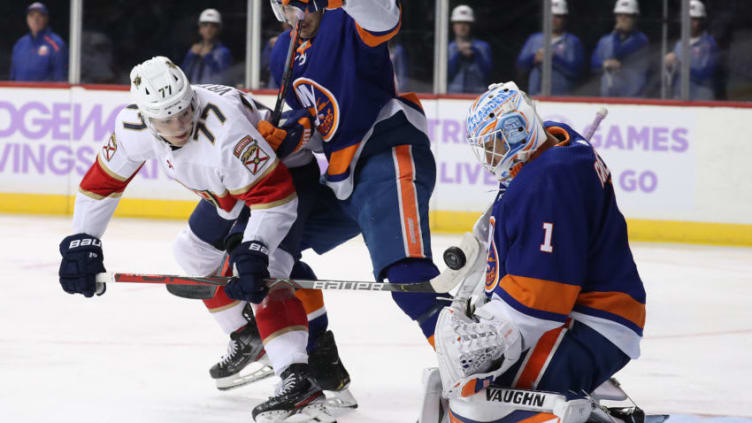Islanders: Weaknesses in almost every aspect of Florida Panthers game

The New York Islanders haven’t seen the Florida Panthers since December 12, what have they been up to?
The New York Islanders and Florida Panthers haven’t seen each other since December 12. On that night the Islanders left Sunrise with a 3-1 win. It was the Isles third win in three games against the Panthers.
But that was months ago. As we prep for the qualifying round against the Panthers, what do we need to know about our opponent? What have they been up to since we last played?
Up until December 12, the Panthers held a 15-11-5 record for a 0.565 points-percentage. After that loss to the Isles on the 12th, they went 20-15-3 for a 0.566 points-percentage. Seems like the team Islanders faced on Dec. 12 were basically the same through the rest of the season. At least at a macro-level.
At a micro-level, this isn’t exactly the same team from December 12.
Trades Made
Since December 12, the Florida Panthers have made four different trades:
- Dec. 17: Kevin Roy (LW) to Pittsburgh for Ryan Haggerty (F)
- Feb. 19: Denis Malgin (C) to Toronto for Mason Marchment (LW)
- Feb. 20: Anthony Greco (RW) to Tampa Bay for Danick Martel (LW)
- Feb. 24: 2020 6th round pick to Dallas for Emil Djuse (LHD)
- Feb. 24: Vincent Trocheck (C) to Carolina for Erik Haula (C), Lucas Wallmark (C), Eetu Luostarinen (C), and Chase Priskie (RHD)
From the last time the Islanders played the Panthers, Vincent Trocheck and Denis Malgin have been replaced in the lineup with Erik Haula and Lucas Wallmark.
So while the record might be virtually identical, the team itself is no longer the same. Has that pushed the Panthers into a different style of play?
Offense
*At 5on5
**In brackets are their rank compared to the rest of the NHL.
The strength of the Florida Panthers was always their forward core. With a top-six that started the season with Aleksander Barkov, Jonathan Huberdeau, Vincent Trocheck, Mike Hoffman, and Evgenii Dadonov the Panthers were a dominant forced offensively.
Their offense was still producing at a top-ten level, but every other aspect of that offense dried up significantly in the second half of the season. That could be by design with Joel Quenneville wanting his team to play better team defense in the second half of the season.
Defense
Except that when you look at some of the Panthers defensive numbers, there’s little change.
- They’re scored on with the same frequency as the first half of the season.
- Their shot share is pretty much the same
- The quality of shots they give up to their opponents increased but not significantly.
What did change was the rate at which other teams get the puck at the Panthers net. With an extra 2.5 shots against per game, the Panthers were one of the most porous teams in the league after Dec. 12.
Combined with a high xGA/G the Panthers defense clearly didn’t get any better in the second half of the season. If Quenneville’s goal was to sacrifice a bit of offense for some defense it backfired massively.
Special Teams
The special teams also took a hit in the second half of the Panthers season. When the Islanders saw them last, the Panthers had one of the best special teams in the league with a top-ten power play and penalty kill.
From December 13 to March 12, both special teams ranked in the second half of the league. The penalty kill took a particular hit dropping all the way to the basement of the league.
Reset
With a four-month break since the last time any NHL team played, the Islanders shouldn’t count on facing the same Florida Panthers team whose offense dried up, couldn’t defend, and who had a special team that wasn’t so special.
But it’s not like the break gives that Panthers a brand new team back.
Sergei Bobrovsky was injured at the tail end of the 2019-20 season, but the Russian goalie wasn’t himself this year with an average 3.23GAA and 0.900SV% and a terrible -14.91 goals saved above average. He has Vezina potential but he certainly wasn’t giving that type of performance this year.
The break will give Joel Quenneville, a three-time Stanley Cup-winning coach, the chance to work out some kinks from the regular season. But it is clear from this micro-level view. There are kinks in just about every aspect of the Panthers game the New York Islanders can exploit.